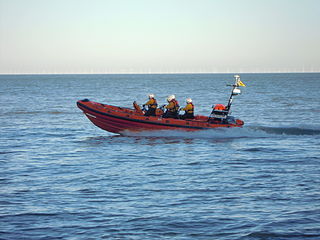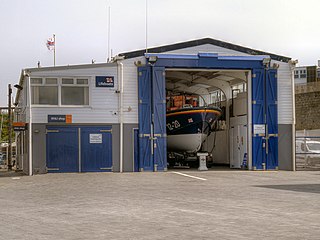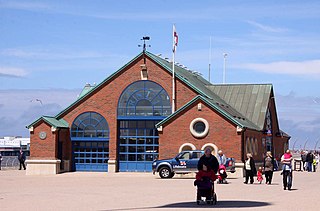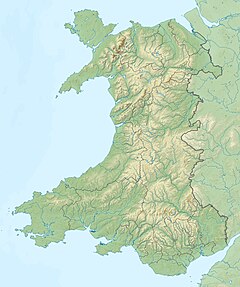
The Atlantic 85 is part of the B-class of lifeboats that serve the shores of the United Kingdom and Ireland as a part of the RNLI inshore fleet.

Walmer Lifeboat Station is located on The Strand on Walmer promenade, in the county of Kent.

Porthcawl Lifeboat Station is located at The Esplanade, in the town of Porthcawl, on the South Wales coast, in Bridgend, Wales.

Burnham-on-Sea Lifeboat Station is the base for Royal National Lifeboat Institution (RNLI) search and rescue operations at Burnham-on-Sea, Somerset in England. A lifeboat was stationed in the town from 1836 until 1930. The present station was opened in 2003. It operates two inshore lifeboats (ILBs), a B-Class rigid-inflatable boat and an inflatable D-Class.

RNLB The Oddfellows (B-818) is the current rigid-inflatable inshore lifeboat on station at the English coastal town of Sheringham in the county of Norfolk in the United Kingdom.

Cardigan Lifeboat Station is located at Poppit Sands, on the southern side of the River Teifi estuary in North Pembrokeshire, approximately 3 miles (4.8 km) north-west of the town of Cardigan, Wales.

Margate Lifeboat Station is a Royal National Lifeboat Institution (RNLI) station located in Margate in the English county of Kent. The station is over 160 years old. Its crews have earned a number of gallantry awards, including five silver and 1 bronze RNLI medals for bravery.

Hunstanton Lifeboat Station is located in the village of Old Hunstanton, in the English county of Norfolk. It is the only lifeboat station on the east coast of England which faces westward, being positioned on the east side of the square-mouthed bay and estuary known as The Wash.

Hayling Island Lifeboat Station is located on the eastern side of Hayling Island, Hampshire, opposite the village of West Wittering, at the entrance to Chichester Harbour, where it joins the major shipping route of the Solent. This major shipping route is busy at all times of the year and there are estimated to be 10,000 boats in the Chichester area alone.

Portsmouth Lifeboat Station is located on Eastney Point near Southsea, in the English county of Hampshire. The station is owned and operated by the RNLI and is an Inshore lifeboat station. The station is facing Langstone Harbour on one of the tributaries flowing into the Solent. The station was established in May 1965.

Littlehampton Lifeboat Station is located in the town of Littlehampton, in West Sussex, on the south coast of England.The station is on the harbour side on the eastern bank of the River Arun, a quarter mile from the harbour entrance and the pier. The current lifeboat house on Fisherman's Quay was built in 2002.

Talus MB-H is a continuous track launch tractor which was specifically designed for the Royal National Lifeboat Institution (RNLI), to launch and recover carriage mounted lifeboats, particularly the Mersey-class lifeboat, from beach-launched lifeboat stations. In total, 31 tractors were manufactured by Clayton Engineering Limited of Knighton, Powys.

Talus MB-4H is a four-wheel-drive launch tractor which was specifically designed for the Royal National Lifeboat Institution (RNLI), to launch and recover inshore lifeboats from beach launched lifeboat stations.

Talus MB-764 is a four-wheel drive launch tractor which was specifically designed for the RNLI, to launch and recover inflatable inshore lifeboats from beach and shorebased launched lifeboat stations. The Tractor is produced by the British company of Clayton Engineering Limited who are based in Knighton, Powys.

The New Holland TC45 is a four-wheel drive compact tractor, adapted to suit the launch and recovery requirements for some of the RNLI's inflatable inshore lifeboats from beach and shore-based lifeboat stations.

The Talus Atlantic 85 DO-DO launch carriage is a Drive On - Drive Off lifeboat launch and recovery carriage used by the RNLI to launch its Atlantic class inshore lifeboats.

Brighton Lifeboat Station is located in the seaside town of Brighton in the county of East Sussex.

Aberystwyth Lifeboat Station is located at South Marine Terrace, in the coastal resort of Aberystwyth, Ceredigion, which sits on Cardigan Bay, on the west coast of Wales.

Blackpool Lifeboat Station is located in-between the North and Central Piers on the promenade in the town of Blackpool in Lancashire. A lifeboat was first stationed in Blackpool by the Royal National Lifeboat Institution in 1864.

Red Bay Lifeboat Station is located at Coast Road, Cushendall, County Antrim, a village at the mouth of the River Dall, in the Glens of Antrim, approximately 20 miles (32 km) north east of Ballymena, on the north-east coast of Northern Ireland.






















